| Listing 1 - 10 of 14 | << page >> |
Sort by
|
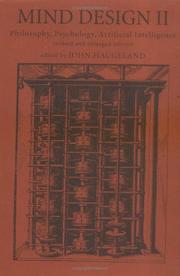
ISBN: 0262581531 0262082594 0262275074 0585023093 9780585023090 9780262082594 9780262581530 9780262275071 Year: 1997 Publisher: Cambridge (Mass.): MIT Press,
Abstract | Keywords | Export | Availability | Bookmark
 Loading...
Loading...Choose an application
- Reference Manager
- EndNote
- RefWorks (Direct export to RefWorks)
Mind design is the endeavor to understand mind (thinking, intellect) in terms of its design (how it is built, how it works). Unlike traditional empirical psychology, it is more oriented toward the "how" than the "what." An experiment in mind design is more likely to be an attempt to build something and make it work--as in artificial intelligence--than to observe or analyze what already exists. Mind design is psychology by reverse engineering.When Mind Design was first published in 1981, it became a classic in the then-nascent fields of cognitive science and AI. This second edition retains four landmark essays from the first, adding to them one earlier milestone (Turing's "Computing Machinery and Intelligence") and eleven more recent articles about connectionism, dynamical systems, and symbolic versus nonsymbolic models. The contributors are divided about evenly between philosophers and scientists. Yet all are "philosophical" in that they address fundamental issues and concepts; and all are "scientific" in that they are technically sophisticated and concerned with concrete empirical research.ContributorsRodney A. Brooks, Paul M. Churchland, Andy Clark, Daniel C. Dennett, Hubert L. Dreyfus, Jerry A. Fodor, Joseph Garon, John Haugeland, Marvin Minsky, Allen Newell, Zenon W. Pylyshyn, William Ramsey, Jay F. Rosenberg, David E. Rumelhart, John R. Searle, Herbert A. Simon, Paul Smolensky, Stephen Stich, A.M. Turing, Timothy van Gelder
Artificial intelligence --- Cognitive psychology. --- 681.3*I20 --- Artificial intelligence (AI) in general; cognitive simulation; philosophical foundations --- Artificial intelligence. --- 681.3*I20 Artificial intelligence (AI) in general; cognitive simulation; philosophical foundations --- Cognitive psychology --- Psychology, Cognitive --- Cognitive science --- Psychology --- AI (Artificial intelligence) --- Artificial thinking --- Electronic brains --- Intellectronics --- Intelligence, Artificial --- Intelligent machines --- Machine intelligence --- Thinking, Artificial --- Bionics --- Digital computer simulation --- Electronic data processing --- Logic machines --- Machine theory --- Self-organizing systems --- Simulation methods --- Fifth generation computers --- Neural computers --- COGNITIVE SCIENCES/General --- PHILOSOPHY/General
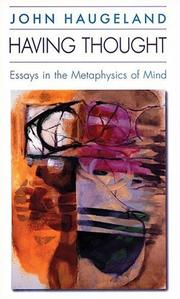
ISBN: 0674382331 Year: 1998 Publisher: Cambridge (Mass.) : Harvard university press,
Abstract | Keywords | Export | Availability | Bookmark
 Loading...
Loading...Choose an application
- Reference Manager
- EndNote
- RefWorks (Direct export to RefWorks)
Philosophy of mind --- Mind, Philosophy of --- Mind, Theory of --- Theory of mind --- Philosophy --- Cognitive science --- Metaphysics --- Philosophical anthropology --- Philosophy of mind.
Book
ISBN: 0262580527 0262081105 9780262580526 Year: 1982 Publisher: Cambridge (Mass.) : MIT press,
Abstract | Keywords | Export | Availability | Bookmark
 Loading...
Loading...Choose an application
- Reference Manager
- EndNote
- RefWorks (Direct export to RefWorks)
Artificial intelligence. --- Cognitive psychology. --- Artificial intelligence (AI) in general; cognitive simulation; philosophical foundations --- 681.3*I20 Artificial intelligence (AI) in general; cognitive simulation; philosophical foundations --- Cognitive psychology --- Artificial intelligence. Robotics. Simulation. Graphics --- Psychology --- Philosophy --- Intelligence artificielle --- Psychologie --- Philosophie --- Artificial intelligence --- Psycholinguistics. --- Philosophy of mind
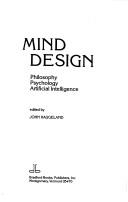
ISBN: 0897060059 0897060040 Year: 1981 Publisher: Montgomery ; Vermont : Bradford Books Publishers,
Abstract | Keywords | Export | Availability | Bookmark
 Loading...
Loading...Choose an application
- Reference Manager
- EndNote
- RefWorks (Direct export to RefWorks)
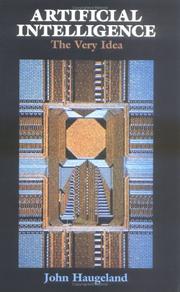
ISBN: 0262081539 9780262291149 9780262580953 0262291142 9780262081535 Year: 1986 Publisher: Cambridge (Mass.): MIT Press,
Abstract | Keywords | Export | Availability | Bookmark
 Loading...
Loading...Choose an application
- Reference Manager
- EndNote
- RefWorks (Direct export to RefWorks)
Artificial intelligence --- Intelligence artificielle --- Artificial intelligence (AI) in general cognitive simulation philosophical foundations --- Applications and expert systems (Artificial intelligence). Cartography. Games. Industrial automation. Law. Medicine and science. Natural language interfaces. Office automation--See also {681.3*H4} {681.3*J} --- 681.3*I21 Applications and expert systems (Artificial intelligence). Cartography. Games. Industrial automation. Law. Medicine and science. Natural language interfaces. Office automation--See also {681.3*H4} {681.3*J} --- 681.3*I20 Artificial intelligence (AI) in general cognitive simulation philosophical foundations --- 681.3*I20 --- 681.3*I21 --- 681.3*I20 Artificial intelligence (AI) in general; cognitive simulation; philosophical foundations --- Artificial intelligence (AI) in general; cognitive simulation; philosophical foundations --- AI (Artificial intelligence) --- Artificial thinking --- Electronic brains --- Intellectronics --- Intelligence, Artificial --- Intelligent machines --- Machine intelligence --- Thinking, Artificial --- Bionics --- Cognitive science --- Digital computer simulation --- Electronic data processing --- Logic machines --- Machine theory --- Self-organizing systems --- Simulation methods --- Fifth generation computers --- Neural computers --- 681.3*I21 Applications and expert systems (Artificial intelligence). Cartography. Games. Industrial automation. Law. Medicine and science. Natural language interfaces. Office automation--See also {681.3*H4}; {681.3*J} --- Applications and expert systems (Artificial intelligence). Cartography. Games. Industrial automation. Law. Medicine and science. Natural language interfaces. Office automation--See also {681.3*H4}; {681.3*J} --- Artificial intelligence. Robotics. Simulation. Graphics --- Artificial intelligence. --- Intelligence artificielle. --- Kunstmatig verstand.
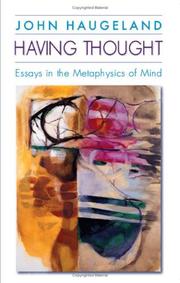
ISBN: 0674004159 Year: 1998 Publisher: Cambridge, Mass. Harvard University Press
Abstract | Keywords | Export | Availability | Bookmark
 Loading...
Loading...Choose an application
- Reference Manager
- EndNote
- RefWorks (Direct export to RefWorks)
Digital
ISBN: 9780674074590 9780674072114 Year: 2013 Publisher: Cambridge, Mass. Harvard University Press
Abstract | Keywords | Export | Availability | Bookmark
 Loading...
Loading...Choose an application
- Reference Manager
- EndNote
- RefWorks (Direct export to RefWorks)
Book
ISBN: 2738100546 9782738100542 Year: 1989 Publisher: Paris: Odile Jacob,
Abstract | Keywords | Export | Availability | Bookmark
 Loading...
Loading...Choose an application
- Reference Manager
- EndNote
- RefWorks (Direct export to RefWorks)
Artificial intelligence. Robotics. Simulation. Graphics --- Artificial intelligence --- Intelligence artificielle --- Artificial intelligence. --- Computers. --- Equipment. --- Sémantique. --- Pensée. --- Esprit et corps. --- Intelligence artificielle. --- Informatique --- Histoire.
Book
ISBN: 0674074629 0674074599 9780674074590 9780674072114 0674072111 9780674074620 Year: 2013 Publisher: Harvard: Harvard university press,
Abstract | Keywords | Export | Availability | Bookmark
 Loading...
Loading...Choose an application
- Reference Manager
- EndNote
- RefWorks (Direct export to RefWorks)
The author of discipline-defining studies of human cognition and artificial intelligence, John Haugeland was a charismatic, highly original voice in the contemporary forum of Anglo-American analytic philosophy. At his death in 2010, he left behind an unfinished manuscript, more than a decade in the making, intended as a summation of his life-long engagement with one of the twentieth century’s most influential philosophical tracts, Heidegger’s Being and Time (1927). Dasein Disclosed brings together in a single volume the writings of a man widely acknowledged as one of Heidegger’s preeminent and most provocative interpreters.A labyrinth of notoriously difficult ideas and terminology, Being and Time has inspired copious commentary. Not content merely to explain, Haugeland aspired to a sweeping reevaluation of Heidegger’s magnum opus and its conception of human life as Dasein—a reevaluation focused on Heidegger’s effort to reawaken philosophically dormant questions of what it means “to be.” Interpreting Dasein unconventionally as “the living of a living way of life,” Haugeland put involvement in a shared world, rather than individual persons or their experience, at the heart of Heidegger’s phenomenology of understanding and truth. Individuality, Haugeland insists, emerges in the call to take responsibility for a collective way of being in the world. He traces this thought to Heidegger’s radical conclusion that one does not truly understand philosophical concepts unless that understanding changes how one lives.As illuminating as it is iconoclastic, Dasein Disclosed is not just Haugeland’s Heidegger—it is a major contribution to philosophy in its own right.
PHILOSOPHY / Movements / Phenomenology. --- Heidegger, Martin, --- Khaĭdegger, Martin, --- Haĭdegger, Martin, --- Hīdajar, Mārtin, --- Hai-te-ko, --- Haidegŏ, --- Chaitenger, Martinos, --- Chaitenker, Martinos, --- Chaintenger, Martin, --- Khaĭdeger, Martin, --- Hai-te-ko-erh, --- Haideger, Marṭinn, --- Heidegger, M. --- Haideger, Martin, --- Hajdeger, Martin, --- הייגדר, מרתין --- היידגר, מרטין --- היידגר, מרטין, --- 海德格尔, --- Chaintenker, Martin, --- Hāydigir, Mārtīn, --- Hīdigir, Mārtīn, --- هاىدگر, مارتين, --- هىدگر, مارتين, --- Philosophie. --- 08.25 contemporary western philosophy (20th and 21th century). --- Heidegger, Martin, - 1889-1976
Book
ISBN: 9780262546577 9780262376570 9780262376563 Year: 2023 Publisher: Cambridge, Mass. The MIT Press
Abstract | Keywords | Export | Availability | Bookmark
 Loading...
Loading...Choose an application
- Reference Manager
- EndNote
- RefWorks (Direct export to RefWorks)
| Listing 1 - 10 of 14 | << page >> |
Sort by
|

 Search
Search Feedback
Feedback About UniCat
About UniCat  Help
Help News
News